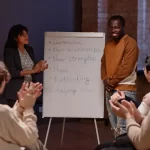Master Social Skills with Dale Carnegie’s Timeless Tips for Success
When it comes to social skills, few have made a mark like Dale Carnegie. His principles, laid out decades ago, still hold true today. If you’re eager to improve your interactions and connect better with others, you’re in the right place. Below, we explore Carnegie’s top tips that can help you attain success in your personal and professional life.
Why Are Social Skills Important?
Social skills are essential. They shape our daily interactions and influence professional advancement. The ability to communicate effectively, resolve conflicts, and build relationships can make or break opportunities. Recognizing the value of these skills is the first step to improvement.
Top Dale Carnegie Tips to Enhance Your Social Skills
Here are Carnegie’s time-tested tips for honing your social skills:
1. Focus on Others
People appreciate when you show genuine interest. Shift your focus away from yourself and ask questions about others. This makes them feel valued and helps you build a rapport.
2. Play the Name Game
Names are important. When you remember someone’s name, it reflects your care and attention towards them. Use their name in conversation—it creates a personal connection.
3. Listen Actively
Listening is just as crucial as speaking. Engage with your conversation partner. Nod, respond, and ask follow-up questions. This shows you care about what they are saying.
4. Show Appreciation
Everyone likes a compliment. Take the time to acknowledge others’ strengths or achievements. A simple “thank you” can go a long way.
5. Be Empathetic
Try to see things from others’ perspectives. Understanding their feelings can help navigate conversations more smoothly.
6. Avoid Arguments
Disagreeing is natural, but arguments can be counterproductive. Aim to find common ground. Focus on the points you agree on before expressing your viewpoint.
7. Make Others Feel Important
Encouragement can boost confidence in others. Speak positively and remind them of their capabilities. When others feel significant, they’ll appreciate you for it.
8. Smile
A smile can be contagious! Smiling makes you appear approachable and friendly. It fosters a positive atmosphere in conversations.
9. Use Body Language
Non-verbal cues are powerful. Maintain open body language, such as uncrossed arms and eye contact, to convey interest and engagement.
10. Be Authentic
Be yourself. Authenticity builds trust in relationships. When you show your true self, you attract like-minded individuals.
How to Implement These Skills
Improving social skills requires practice, just like any other skill. Here are simple ways to integrate Carnegie’s techniques into your life:
- Start Small: Begin conversations with colleagues or acquaintances. Practice using their names and active listening.
- Join Groups: Engaging in community activities can provide ample opportunities to practice these skills.
- Reflect: After social interactions, think about what went well and areas for improvement.
The Impact of Mastering Social Skills
Mastering social skills opens doors. It enhances career prospects, nurtures relationships, and leads to personal growth. Engaging positively with others can lead to better collaboration and understanding. Here’s what you may gain:
- Stronger Relationships: You’ll foster connections that can be beneficial personally and professionally.
- Enhanced Career Opportunities: Being likable and personable can put you ahead in job interviews and teamwork.
- Increased Confidence: As you improve your skills, you’ll feel more comfortable in social situations.
Reflect and Commit
Are you ready to take the plunge? Reflect on your social interactions. Consider which of Carnegie’s tips resonate with you and make a conscious effort to incorporate them into your daily routine.
As you engage with others, remember that it’s not just about what you say, but how you make others feel. The path to mastering social skills may require effort, but the rewards are worth it. Each interaction is an opportunity for growth.
In closing, model your social behavior around Dale Carnegie’s principles, and watch how your interactions change for the better. You don’t need to be an extrovert to connect meaningfully; just be open and genuine.
Embrace these tips. After all, everyone deserves to feel valued and respected in a conversation. Start today, and soon you’ll notice a positive shift in your social engagements. Happy connecting!








